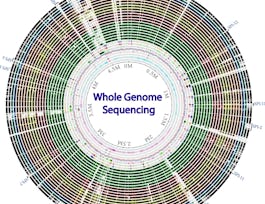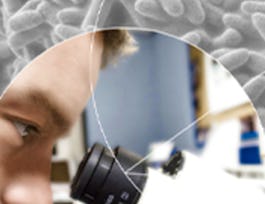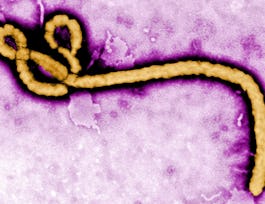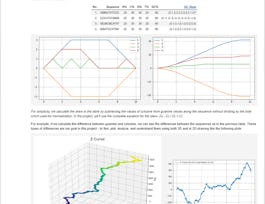Antimicrobial resistance is an increasingly pressing global concern. This course offers unique and comprehensive insights into the challenges posed by AMR, exploring its mechanisms, implications for public health and laboratory methods as well as tools for identification.


Antimicrobial resistance - theory and methods
Taught in English
Some content may not be translated
63,949 already enrolled
(2,279 reviews)
Recommended experience
What you'll learn
Prepare for a career with our Intermediate level course in understanding AMR.
Apply new skills to projects and portfolio.
Learn and develop in demand skills and relevant knowledge for identification of AMR and laboratory methods.
Learn the most up-to-date theoretical & practical skills in antimicrobial resistance identification and testing.
Skills you'll gain
Details to know

Add to your LinkedIn profile
7 quizzes
See how employees at top companies are mastering in-demand skills


Earn a career certificate
Add this credential to your LinkedIn profile, resume, or CV
Share it on social media and in your performance review

There are 7 modules in this course
This module is a welcome to the course where you can find information on the course structure, the content that you will be introduced to in the next modules, the grading, as well as an introduction to the instructors and the teaching material.
What's included
1 video1 reading
In this module you will learn about antibiotics/ antimicrobials and you will get to know more about what they are, where they come from, what are the major groups and how can we classify them, as well as how do they have an effect and how do they act on the bacterial cells.
What's included
2 videos1 quiz
This module contains information about antimicrobials and the development of resistance in bacteria including causes for resistance and their mechanisms, as well as an insight in how resistance disseminates and how it can be selected.
What's included
4 videos1 quiz
This module deals with antimicrobial susceptibility testing in the laboratory: its importance and use, descriptions of the methods and their applications and detailed descriptions of the procedures applied for the main methods. Additionally, this module gives practical insight on how to interpret antimicrobial susceptibility results.
What's included
9 videos2 quizzes
As alternative to the phenotypical methods, the researcher might decide to use genotypically based methods to identify genes of interest. In the lectures of this module we present the ResFinder tool which may be used to find resistance mechanisms ( genes and in the future versions also specific point mutations) from Whole genome sequences of bacteria of interest. The second lecture is a demonstration of the MyDBFinder which can be used to identify genes of interest defined by the user from Whole genome sequence data.
What's included
2 videos1 quiz
This module is dedicated to Quality management and Quality assurance (QA)/ Quality control (QC) procedures and use of QC strains to assure the quality of results of antimicrobial susceptibility testing: importance, elements and principles.
What's included
2 videos1 quiz
The module provides an in-depth understanding of critical important antimicrobials (CIA). You will explore the importance of CIAs, the mechanism of action and the challenges associated.
What's included
6 videos1 quiz
Instructors



Offered by
Recommended if you're interested in Basic Science

Technical University of Denmark (DTU)

University of Copenhagen

Emory University

Coursera Project Network
Why people choose Coursera for their career




Learner reviews
Showing 3 of 2279
2,279 reviews
- 5 stars
73.79%
- 4 stars
21.69%
- 3 stars
3.90%
- 2 stars
0.30%
- 1 star
0.30%
New to Basic Science? Start here.

Open new doors with Coursera Plus
Unlimited access to 7,000+ world-class courses, hands-on projects, and job-ready certificate programs - all included in your subscription
Advance your career with an online degree
Earn a degree from world-class universities - 100% online
Join over 3,400 global companies that choose Coursera for Business
Upskill your employees to excel in the digital economy
Frequently asked questions
Access to lectures and assignments depends on your type of enrollment. If you take a course in audit mode, you will be able to see most course materials for free. To access graded assignments and to earn a Certificate, you will need to purchase the Certificate experience, during or after your audit. If you don't see the audit option:
The course may not offer an audit option. You can try a Free Trial instead, or apply for Financial Aid.
The course may offer 'Full Course, No Certificate' instead. This option lets you see all course materials, submit required assessments, and get a final grade. This also means that you will not be able to purchase a Certificate experience.
When you purchase a Certificate you get access to all course materials, including graded assignments. Upon completing the course, your electronic Certificate will be added to your Accomplishments page - from there, you can print your Certificate or add it to your LinkedIn profile. If you only want to read and view the course content, you can audit the course for free.
You will be eligible for a full refund until two weeks after your payment date, or (for courses that have just launched) until two weeks after the first session of the course begins, whichever is later. You cannot receive a refund once you’ve earned a Course Certificate, even if you complete the course within the two-week refund period. See our full refund policy.


